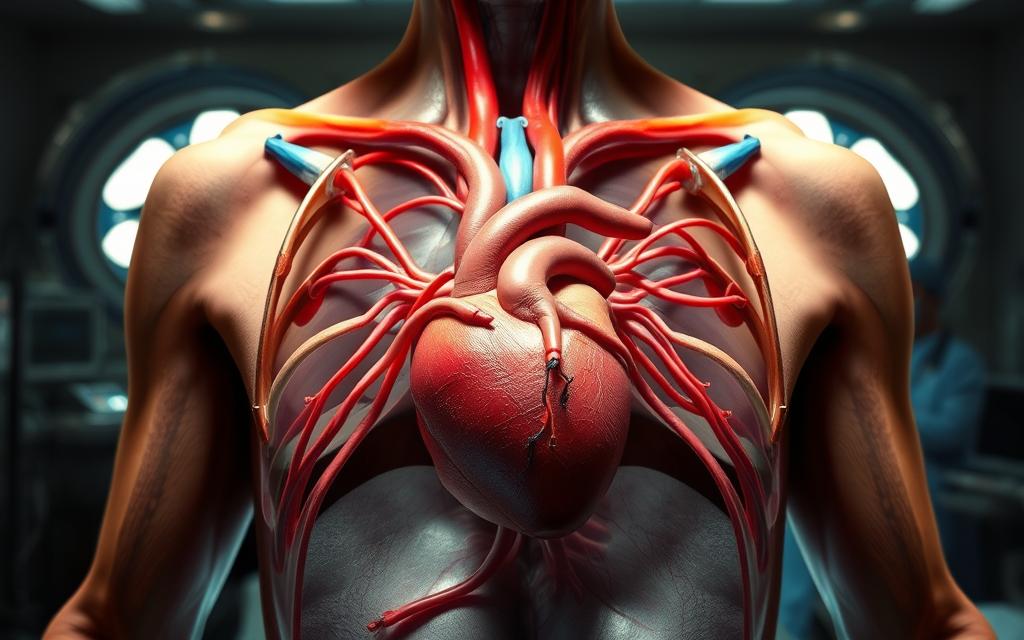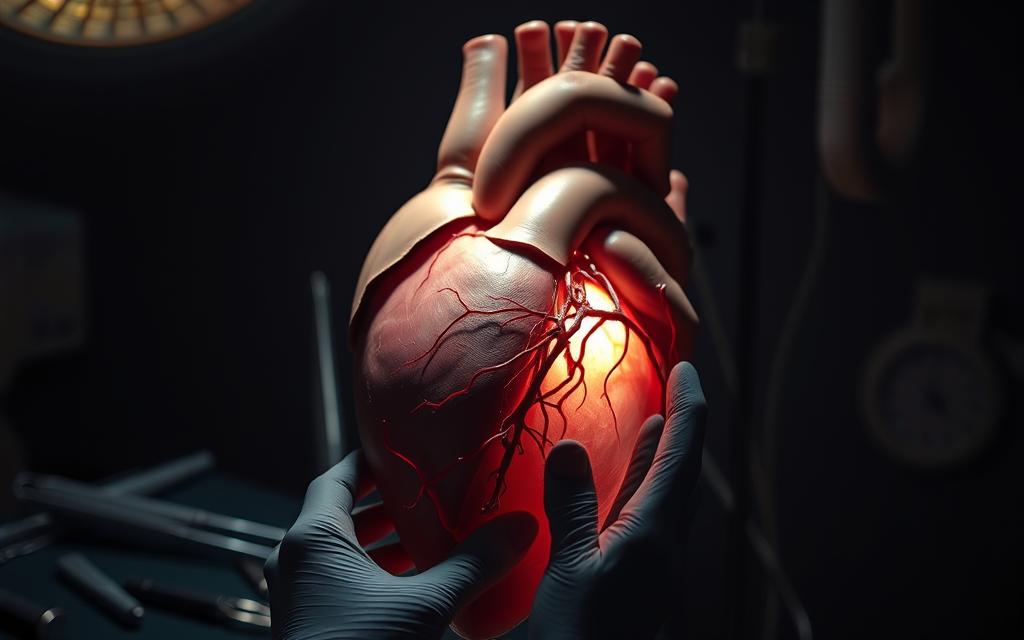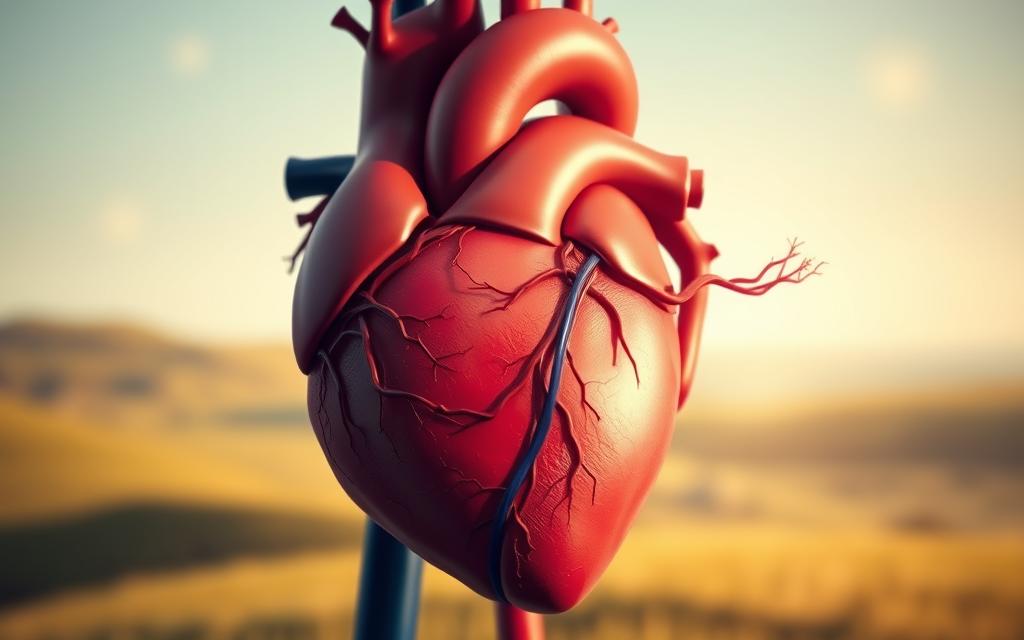Does Bypass Surgery Help Erectile Dysfunction? | Heart Health & ED Connection
The connection between heart health and sexual wellness is complex, and the relationship between bypass surgery and erectile dysfunction (ED) is a topic of increasing interest.
Many men who undergo coronary artery bypass grafting (CABG) often wonder if this surgery will improve their ED symptoms. Research suggests that there is a significant link between cardiovascular health and ED, as both conditions share common risk factors.
Understanding the ED connection to heart health can provide insights into how treatments like bypass surgery might impact sexual function. By exploring this link, individuals can better navigate their treatment options and improve their overall well-being.
The Connection Between Heart Disease and Erectile Dysfunction
The relationship between heart health and erectile dysfunction is multifaceted, involving various physiological and lifestyle factors. At its core, both conditions are influenced by the health of the cardiovascular system.
Shared Risk Factors for Cardiovascular Disease and ED
Both heart disease and erectile dysfunction share common risk factors, including high blood pressure, diabetes, high cholesterol, and smoking. These factors contribute to the deterioration of vascular health, affecting both the heart and sexual function. Managing these risk factors is crucial for preventing both conditions.
How Arterial Blockages Affect Both Heart and Sexual Function
Arterial blockages, often a result of plaque buildup, can restrict blood flow to the heart, leading to heart disease. Similarly, reduced blood flow to the penis can cause erectile dysfunction. The endothelial dysfunction associated with arterial blockages is a key factor in both conditions.
Why ED Can Be an Early Warning Sign of Heart Problems
Erectile dysfunction can often be an early indicator of underlying cardiovascular issues. The same vascular problems that cause ED can lead to more severe heart conditions if left unaddressed. Recognizing ED as a potential warning sign allows for early intervention and management of heart disease risk factors.
Understanding the link between heart disease and erectile dysfunction highlights the importance of a holistic approach to health, focusing on improving cardiovascular wellness to mitigate the risk of both conditions.
Understanding Bypass Surgery and Its Effects on the Body
Bypass surgery, also known as coronary artery bypass grafting (CABG), is a complex procedure that aims to restore blood flow to the heart. This surgical intervention is typically recommended for patients with severe coronary artery disease, where the arteries supplying blood to the heart are blocked or narrowed.

What Happens During Coronary Artery Bypass Grafting (CABG)
During CABG, the surgeon takes a healthy blood vessel from another part of the body and grafts it onto the blocked coronary artery, creating a detour or “bypass” around the obstruction. This procedure can significantly improve blood flow to the heart muscle, reducing symptoms like chest pain and shortness of breath.
The surgery is usually performed under general anesthesia and can take several hours to complete. The surgeon may use a heart-lung machine to keep the heart beating during the procedure, although some surgeries are now performed “off-pump” without this machine.
Recovery Timeline and Physical Limitations After Surgery
The recovery process after bypass surgery is crucial for achieving optimal outcomes. Initially, patients are closely monitored in the intensive care unit (ICU) before being transferred to a regular hospital room. The typical hospital stay ranges from 5 to 7 days.
Post-surgery, patients are advised to avoid heavy lifting, bending, or strenuous activities for several weeks. The full recovery timeline can vary, but most patients can resume normal activities within 6 to 12 weeks. It’s essential to follow the surgeon’s instructions regarding physical limitations and rehabilitation exercises to ensure a smooth recovery.
Systemic Effects of Improved Circulation Post-Surgery
One of the significant benefits of CABG is the improvement in circulation not just to the heart but potentially to other parts of the body as well. Enhanced blood flow can lead to increased energy levels and overall physical well-being. Moreover, successful bypass surgery can reduce the risk of heart-related complications and improve long-term survival.
Improved circulation post-surgery can also have a positive impact on other bodily functions, potentially enhancing overall quality of life. However, it’s crucial for patients to maintain a heart-healthy lifestyle, including a balanced diet, regular exercise, and stress management, to maximize the benefits of the surgery.
Can Sugar Cause Erectile Dysfunction? Exploring the Connection
High sugar diets have been associated with a range of health problems, including an increased risk of erectile dysfunction. The connection between sugar consumption and ED is complex, involving factors such as blood vessel damage, insulin resistance, and overall dietary patterns.
How High Blood Sugar Damages Blood Vessels
High blood sugar levels can damage the blood vessels throughout the body, including those that supply blood to the penis. When blood vessels are damaged, it can lead to erectile dysfunction. This damage is often a result of advanced glycosylation end-products (AGEs) that form when sugar molecules bind to protein or fat molecules in the bloodstream.
The Role of Insulin Resistance in Sexual Dysfunction
Insulin resistance, a precursor to type 2 diabetes, is closely linked to excessive sugar consumption. Insulin resistance affects the body’s ability to regulate blood sugar levels, leading to a cascade of metabolic issues that can contribute to erectile dysfunction.
Sugar Consumption Patterns and Their Impact on ED Risk
The way we consume sugar can significantly impact our risk of developing erectile dysfunction. Different types of sugar and their sources play a crucial role in this risk.
Processed Sugars vs. Natural Sugars
Processed sugars, found in foods like baked goods and sugary drinks, are quickly absorbed into the bloodstream, causing spikes in blood sugar levels. In contrast, natural sugars, such as those found in fruits and vegetables, are generally consumed along with fiber, which slows down their absorption and mitigates their negative effects.
Hidden Sources of Sugar in the American Diet
Many foods in the American diet contain hidden sugars, making it difficult for consumers to track their sugar intake. Common culprits include breakfast cereals, flavored yogurts, and sauces.
| Food Category | Common High Sugar Foods | Hidden Sugar Sources |
|---|---|---|
| Breakfast Foods | Cereals, Pastries | Flavored Yogurts, Granola |
| Beverages | Soda, Energy Drinks | Flavored Coffee, Fruit Juices |
| Snacks | Candy, Baked Goods | Flavored Chips, Protein Bars |
Understanding the sources of sugar in our diet is crucial for making informed choices that can help mitigate the risk of erectile dysfunction.
Bypass Surgery’s Impact on Sexual Function
Bypass surgery can be a turning point for patients with heart disease, and its impact on sexual function is a significant consideration for overall well-being. Many patients undergoing coronary artery bypass grafting (CABG) wonder how this major surgery will affect their sexual health.

Timeline for Sexual Function Recovery After Surgery
The recovery of sexual function after bypass surgery varies among individuals. Generally, patients are advised to avoid strenuous activities, including sexual intercourse, for several weeks post-surgery. The typical timeline for resuming sexual activities is between 6 to 12 weeks after surgery, depending on the patient’s overall health and the surgeon’s recommendations.
During this period, it’s essential for patients to follow their healthcare provider’s guidance to ensure a safe and healthy recovery.
Percentage of Patients Experiencing ED Improvement
Studies have shown that a significant percentage of patients experience an improvement in erectile dysfunction (ED) symptoms after bypass surgery. Improved blood flow and reduced cardiovascular risk factors contribute to this improvement. However, the extent of improvement can vary based on individual health conditions and the presence of other risk factors for ED.
Factors That Influence Post-Surgery Sexual Outcomes
Several factors can influence sexual outcomes after bypass surgery. These include:
- Age and Pre-existing Conditions: Older patients or those with pre-existing health conditions such as diabetes or hypertension may have different outcomes compared to younger patients or those without such conditions.
- Surgical Technique and Complications: The technique used for CABG and any complications during or after surgery can also impact sexual function recovery.
Age and Pre-existing Conditions
Age is a significant factor in recovery, with older patients potentially facing more challenges. Pre-existing conditions can also complicate the recovery process, making it essential for patients to discuss their individual risk factors with their healthcare provider.
Surgical Technique and Complications
The surgical technique used can affect outcomes. Minimally invasive techniques, for example, may result in less trauma to the body and potentially quicker recovery times. Complications during surgery, such as nerve damage, can negatively impact sexual function.
Understanding these factors and discussing them with a healthcare provider can help manage expectations and improve sexual health outcomes after bypass surgery.
Lifestyle Modifications for Heart Health and Sexual Wellness
Adopting a healthier lifestyle can significantly improve both heart health and sexual wellness. By making a few simple changes, individuals can enhance their overall well-being and address issues such as erectile dysfunction.
Heart-Healthy Diet Changes That Also Benefit Sexual Function
A diet rich in fruits, vegetables, whole grains, and lean proteins can improve heart health and, by extension, sexual function. Foods high in antioxidants, such as berries and leafy greens, help reduce inflammation and improve blood flow. Quitting smoking and reducing alcohol consumption also contribute to better heart health and sexual wellness.
Exercise Recommendations for Post-Bypass Patients with ED
Regular physical activity is crucial for heart health and can also improve sexual function. For post-bypass patients, starting with gentle exercises like walking or swimming can be beneficial. As health improves, more intense activities can be introduced. Exercise not only enhances cardiovascular health but also boosts mood and energy levels.
Stress Management Techniques for Cardiovascular and Sexual Health
High stress levels can negatively impact both heart health and sexual wellness. Techniques such as meditation, yoga, and deep breathing exercises can help manage stress. Engaging in hobbies or spending time in nature are also effective ways to reduce stress and improve overall well-being.
Quitting Smoking and Limiting Alcohol: Dual Benefits
Quitting smoking and limiting alcohol consumption have dual benefits for both heart health and sexual wellness. Smoking cessation improves blood flow and overall cardiovascular health, while reducing alcohol intake can enhance sexual function and overall well-being.
By incorporating these lifestyle modifications, individuals can take significant steps towards improving their heart health and sexual wellness. It’s about making sustainable changes that enhance overall quality of life.
Conclusion: Taking Control of Your Heart and Sexual Health
Understanding the intricate relationship between heart health and sexual wellness is crucial for overall well-being. As discussed, erectile dysfunction can often be an early warning sign of underlying cardiovascular issues, making it essential to address both aspects simultaneously.
By undergoing coronary artery bypass grafting (CABG) or making lifestyle modifications such as adopting a heart-healthy diet, exercising regularly, managing stress, and quitting smoking, individuals can significantly improve their heart health and, in turn, their sexual function.
Taking control of your health involves being proactive about your heart health and sexual wellness. By doing so, you can reduce the risk of cardiovascular disease and improve your overall quality of life. It’s about making informed decisions and working closely with healthcare professionals to achieve optimal health outcomes.
Empowering yourself with knowledge and taking proactive steps can lead to a healthier, more fulfilling life, where heart health and sexual health are prioritized and intertwined.
